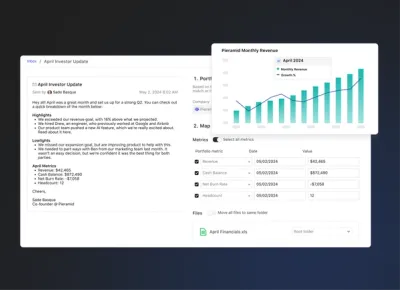
Venture Capital vs. Angel Investors: Which Path Is Right for Your Startup?

Every startup founder eventually faces the critical decision of how to fund their business. Once you’ve determined that raising capital is the right path, the next step is deciding which type of investor best fits your needs: venture capitalists or angel investors. Both offer unique advantages and challenges depending on your growth stage, funding goals, and long-term vision. Whether you're a first-time founder or new to fundraising, understanding the differences between these two funding sources is key to making an informed decision. In this guide, we’ll explore the distinctions between venture capital and angel investors and provide practical advice on when and how to approach each.

What Are Venture Capitalists?
Venture capitalists (VCs) are investors who provide funding to early-stage, high-potential startups in exchange for equity, or ownership shares, in the company. They typically operate through venture capital firms that pool money from various sources to create a managed fund. These sources include high-net-worth individuals, institutional investors, corporations, and other entities known as limited partners (LPs). LPs provide the capital but leave the investment decisions to the general partners (GPs), who are the venture capitalists managing the fund. LPs expect a return on their investment, while GPs use their expertise to identify and invest in startups that show the potential for rapid growth and high returns.
How Venture Capital Works
Venture capital funding follows a structured process, typically broken down into different stages, known as funding rounds. Startups generally progress from seed funding to Series A, B, C, and beyond, with each round representing increased capital raised and expectations for growth.
In the early stages, startups may receive seed funding from venture capital firms to help develop their product and prove the concept. As the business gains traction, it moves into larger rounds, such as Series A, which is used to scale the company, grow its team, and expand into new markets. Later rounds, like Series B and C, focus on further growth and scaling, often leading to an eventual exit via an IPO or acquisition.
Venture capitalists conduct due diligence before investing, analyzing the startup’s market opportunity, product potential, and founding team’s expertise. In exchange for their investment, VCs receive equity in the company and often take an active role in guiding its growth, such as by joining the board of directors.
VCs expect startups to have high growth potential and scalability, with the ability to disrupt existing markets or create entirely new ones. In return, they seek significant returns on their investment, typically aiming for 10x or more. This expectation drives VCs to focus on companies that can scale quickly and potentially become “unicorns”—startups valued at over $1 billion.
Related resource: What to Include in a Data Room for Investors: Essential Guide for Startups
Advantages of Venture Capital
Venture capital offers several advantages for startups looking to grow rapidly and achieve significant market impact:
- Access to large capital: One of the primary benefits of venture capital is the ability to raise substantial amounts of funding. This is especially valuable for startups in capital-intensive industries like technology, biotech, or hardware, where scaling requires significant resources.
- Strategic support: Beyond providing funding, VCs often offer strategic guidance and mentorship. With their deep industry knowledge and extensive networks, venture capitalists can help startups refine their business models, access key markets, and connect with potential partners, customers, or even future investors.
- Opportunities for rapid scaling: With large capital infusions, startups can accelerate their growth by hiring top talent, expanding into new markets, and investing in product development. Venture capital funding enables companies to pursue aggressive growth strategies that might otherwise be out of reach with smaller funding sources.
- Credibility and visibility: Securing venture capital from a well-known firm can serve as a strong endorsement for a startup, boosting its credibility with customers, potential employees, and future investors. Increased visibility can help open doors and attract additional opportunities.

Disadvantages of Venture Capital
While venture capital can offer substantial benefits, there are also significant downsides that founders should carefully consider:
- Dilution of ownership: In exchange for large sums of capital, VCs take equity in the company. As a result, founders often see their ownership stake reduced, especially after multiple funding rounds. This dilution can leave founders with a smaller percentage of the company over time, even if the valuation increases.
- Loss of control: Venture capitalists frequently require a seat on the board and may have a say in key decisions, such as company strategy, hiring, and exit planning. This can limit the founder’s autonomy and introduce differing priorities, especially if the VC’s goals do not fully align with the founder’s vision for the company.
- Pressure for quick exits: VCs typically seek a return on their investment within 5-10 years, often through an acquisition or IPO. This pressures startups to grow and scale rapidly, potentially leading to decisions focused on short-term gains rather than long-term stability. Founders may feel pushed toward an exit strategy earlier than they are comfortable with.
- High expectations: Because VCs are looking for significant returns, they expect startups to achieve rapid growth. This can lead to increased stress and pressure on founders to hit aggressive milestones, often at the cost of the company's culture or long-term sustainability.
Related resource: Our Guide to Building a Seed Round Pitch Deck: Tips & Templates
Key Differences Between Angel Investors and Venture Capital
While both angel investors and venture capitalists provide funding to startups, they operate in distinct ways and cater to different stages of growth. Angel investors tend to invest earlier, often with a more personal and flexible approach, whereas venture capitalists come in during later stages, offering larger sums of capital and more structured involvement. Understanding these key differences is crucial for founders as they decide which type of funding is best suited for their startup’s needs, growth goals, and long-term vision.
1. Investment Stage
Angel investors typically enter the picture at the earliest stages of a startup’s development. They often provide funding during the seed stage, when a company is just starting out and may not yet have a fully developed product, steady revenue, or proven market fit. Angels are often willing to take on higher risks and support startups in their infancy, helping founders turn ideas into viable businesses.
On the other hand, venture capitalists usually invest during later stages of growth. Startups that seek VC funding have typically moved beyond the idea phase and are beginning to scale, with some level of market validation and revenue generation. VC funding often comes into play in Series A rounds and beyond, when larger sums of capital are required to fuel rapid expansion, hire additional talent, or enter new markets.
2. Investment Amount
One of the most notable differences between angel investors and venture capitalists is the amount of money they typically invest. Angel investors usually provide smaller sums, often ranging from $25,000 to $100,000 per deal, though in some cases, they may invest up to $500,000. Their investments are generally sufficient for startups in the early stages, such as covering product development, initial hiring, or early marketing efforts.
Venture capitalists, on the other hand, invest much larger amounts. For example, in a Series A round, VC firms may invest anywhere from $1 million to $10 million or more, depending on the company’s potential and the firm’s investment thesis. As a startup progresses to later rounds (Series B, C, etc.), the investment amounts can increase significantly, often reaching tens or even hundreds of millions. This capital is geared toward aggressive scaling, including market expansion, large-scale hiring, and product development.
3. Level of Involvement
Angel investors often take a hands-on, personal approach to the startups they fund. Since many angels invest their own money, they tend to be more emotionally invested in the company's success. Angels frequently provide personalized mentorship and guidance, leveraging their experience to help founders navigate early challenges. In some cases, angel investors might even have direct relationships with the founders, allowing for a more informal, collaborative dynamic. This personal involvement can be highly beneficial for early-stage startups that need both financial support and hands-on advice.
Venture capitalists, by contrast, tend to have a more structured and strategic role. While VCs may offer mentorship and strategic guidance, their involvement is often more formalized, especially in later stages. VCs usually sit on the board of directors and participate in high-level decision-making, helping shape the company’s long-term strategy, product direction, and scaling efforts. However, VCs are often less involved in day-to-day operations, leaving the founders and executive team to manage the company’s execution.

4. Risk Tolerance
Angel investors tend to have a higher risk tolerance compared to venture capitalists. Since angels often invest in the earliest stages of a startup, they are accustomed to backing unproven business models, nascent products, and founders who may not have extensive experience. For angel investors, the potential for high returns justifies the risk, and they are often willing to take a chance on innovative ideas or disruptive technologies that might not yet have market validation. This willingness to take on higher risk makes angel investors particularly valuable for startups still in the idea or prototype phase.
On the other hand, venture capitalists typically seek more proven business models. While VCs are still taking significant risks, they generally prefer startups that have already demonstrated product-market fit, some level of revenue, and the ability to scale. By the time a venture capital firm invests, the company’s risks are more related to execution and growth rather than proving the core viability of the business. VCs conduct extensive due diligence to mitigate these risks and look for startups with a clear path to substantial returns.
5. Decision-Making Process
The decision-making process for angel investors is typically quicker and more informal than venture capitalists. Since angels often invest their own money, they can make independent decisions based on their judgment and intuition. This can result in faster funding decisions, especially if the angel investor has a personal connection with the founder or is passionate about the industry. Angel investors may rely less on extensive due diligence, instead placing greater trust in the founder's vision and potential.
Venture capitalists, on the other hand, follow a more formal and rigorous decision-making process. Since VCs manage funds from limited partners, they must ensure each investment aligns with the fund’s strategy and risk tolerance. VCs typically conduct thorough due diligence, which involves analyzing the startup’s financials, market opportunity, product, and team. This process can take several weeks or months as VCs carefully vet the company to minimize risk. Additionally, decisions are often made by an investment committee, further adding to the complexity and formality of the process.
6. Exit Strategy
The exit strategies of angel investors and venture capitalists differ significantly in terms of flexibility and expectations for returns. Angel investors generally have more flexible exit strategies because they are often motivated by factors beyond financial returns, such as a personal passion for the business or a desire to support entrepreneurs. Angels may be satisfied with smaller exits, such as when the company is acquired or returns a modest profit. They are often open to longer timelines and may not push for an aggressive exit, allowing the startup more room to grow at its own pace.
Venture capitalists, however, typically have more specific and ambitious exit goals. Since VCs are responsible for delivering high returns to their limited partners, they often aim for significant exits through initial public offerings (IPOs) or large acquisitions. VCs usually operate on a timeline of 5-10 years to realize their returns, and they push for scaling and growth that align with these exit strategies. As a result, venture capital-backed companies are more likely to pursue aggressive growth plans to meet the high return expectations of their investors.
When to Pitch Venture Capitalists
When considering venture capital, it’s essential to understand the structure of a VC firm. Venture capital firms are typically divided into general partners (GPs), who manage the firm and make investment decisions, and limited partners (LPs), who provide the capital but don’t participate in the decision-making. Limited partners may include wealthy individuals, insurance companies, pension funds, and foundations.
VCs are looking to invest in startups that have the potential to deliver outsized returns. They aim to secure a spot on the Power Law Curve, where a small percentage of companies generate most industry returns. For this reason, VCs are often searching for unicorns- startups with a valuation over $1 billion- that can provide exponential returns on investment.
When pitching to VCs, it’s important to know what they are looking for: a strong combination of product, market, and team.
- Product: VCs want to see a product that stands out and has the potential to dominate its market. Your product should be a "need to have," not just a "nice to have."
- Market: A large market opportunity is crucial. The larger and less saturated the market, the better. However, being too early in an untapped market can also pose risks for VCs.
- Team: A talented and experienced founding team can be a key differentiator. VCs are more likely to take a risk on a startup led by seasoned industry veterans or entrepreneurs with a proven track record of success.
If you’re confident in your product, the market you’re entering, and the team you’ve built, pitching to venture capitalists could be the right move for your startup.
When to Pitch Angel Investors
While VCs are looking for that perfect mix of Market, Product, and Team and always searching for the elusive unicorn to double or triple their money, Angels may be a better bet if you’re extremely small and looking to get started vs. scale rapidly. Typically, angels offer better terms for investment. Angels of course still look for returns. However, they may also invest because they are passionate about the space, and because it’s their money directly, are more open to investing in an idea that will potentially just make them their money back in order to help a new entrepreneur get off the ground. Funding rounds with angel investors are often called “friends and family” rounds because its much more common for individuals to invest in those they care about and believe in vs. the biggest and best ideas.
Angel investors are better to pitch to when your company is extremely early stage. When starting the company look to close friends, family, and professionals that can make a small investment and when you’re ready to scale quickly and take more risk after you’ve proven your concept a bit more, turn to VCs.
Recommended Reading: The Understandable Guide to Startup Funding Stages

Manage Investor Relationships Effectively with Visible
Choosing between angel investors and venture capitalists depends on your startup’s stage, funding needs, and long-term goals. Angels typically invest early and offer flexible terms, while VCs provide larger sums for rapid scaling but expect high returns and growth. Understanding the key differences—such as investment size, risk tolerance, and exit strategies—will help you make informed decisions about which type of funding best suits your business.
As you prepare for your startup’s next steps, ensure you stay connected with potential investors using Visible.
- Find investors at the top of your funnel with our free investor database, Visible Connect
- Track your conversations and move them through your funnel with our Fundraising CRM
- Share your pitch deck and monthly updates with potential investors
- Organize and share your most vital fundraising documents with data rooms
Manage your fundraise from start to finish with Visible. Give it a free try for 14 days here.
Related Resource: Top 6 Angel Investors in Miami



